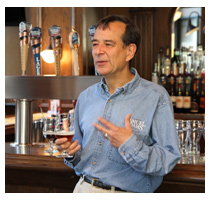
Craft brewers from all over the country are putting their weight behind an Environmental Protection Agency (EPA) proposal that would extend the federal government’s power to enforce the Clean Water Act.
In total, 40 craft brewers — including industry stalwarts such Goose Island, Lagunitas, Founders, and Sierra Nevada — have teamed up with the Natural Resources Defense Council to push for the proposed rule, which aims to clarify the EPA’s regulation parameters relating to small bodies of water.
Citing the importance of water to the brewing process, Ian Hughes, assistant brewery manager of Chicago’s Goose Island, described the effort to Newsweek as a “beautiful thing.”
“It allows something so simple as a glass of beer to be a speaking point for the importance of clean water,” he told the website.
The proposal will remain open for public comment until November 14.
Beer Industry of Florida Backs Growler Initiative
Exclaiming customers benefit from both increased competition and selection, a network of Florida beer wholesalers last week published a video campaign declaring their support for the legalization of 64 oz. growlers in the state.
The Beer Industry of Florida (BIF), whose MillerCoors-aligned members carry import, craft, and macro brands alike, claims to be in the process of “mobilizing an industry-wide coalition to make this new container size legal, no strings attached.”
Florida’s ban on 64 oz. growlers is a hot button legislative issue and one that craft brewers lobbied to change in March. Currently, brewers are allowed to sell 32 oz. and 128 oz. to-go containers directly to consumers, but restricted from selling the highly-coveted 64 oz. growlers, which are an industry standard.
The BIF’s support of change only extends so far, however.
“What we don’t want to see is a return to the ‘bad old days’ when totally unrestricted breweries sold directly to the public and even delivered to homes,” the video stated. “And why not? Because direct sales resulted in a beer bubble, culminating in aggressive tactics and deep discounts that hurt retail businesses.”
Bell’s Expands Eccentric Café
Bell’s Brewery has begun construction on an expansion that will transform its Eccentric Café in downtown Kalamazoo, Mich. into a full-service restaurant, as it plans to add up to 130 new seats and occupy more than 6,600 sq. ft. of space previously utilized for storage.
“Our goal is to match and even enhance the high quality beer that is already being served with high quality food and service,” Bell’s retail director, Jason Reicherts, said in a statement.
Last week, the brewery announced plans to host a career fair on Oct. 25 at its facility in Comstock to immediately fill 20 positions at the café. The fair will be part of a broader initiative to hire more than 100 people to fill both full-and part-time positions at its brewery and retail locations as it undergoes “multiple expansions.”
Taplister Gets New Majority Owner
Kerry Finsand, founder of Taplister, an app that lists which beers are being served at different establishments in a given area, has sold a majority of his startup.
“Earlier this year, after years of bootstrapping Taplister, I came to the conclusion it was time for me to move on to new things,” Finsand wrote on the company’s blog last week. “This was not a quick or easy decision. I have always been proud to be involved in the craft beer industry where I enjoy seeing the industry’s current rapid growth and found my involvement as an early player in the digital space for craft beer very rewarding.”
Though Finsand remains a minority owner and plans to continue with outreach, marketing, and sales, Mark Meyer is the new majority owner of the company. Throughout the search for a buyer, Finsand wrote, Meyer hired a new development team and has been working to update the app’s software.

“The Steve Jobs of Beer”
The Atlantic just published a profile of Jim Koch, the perpetually denim-shirted billionaire founder of Boston Beer and a pioneer in the craft beer industry, headlined “The Steve Jobs of Beer.”
Predictably, Koch’s oft-cited yeast trick (eat yeast before drinking beer and don’t get drunk) earns high mention in the story, but deeper, the Steve Jobs parallel is drawn thusly:
“Koch has made a very successful business out of satisfying a demand people didn’t know they had.”
Koch expounded on his love of his craft, but extended the importance of quality American made beer to an issue of economics and good manufacturing practices.
“We’re part of the manufacturing renaissance! If there was no craft-beer movement, people who wanted more-flavorful beer would be drinking imports. These are high-paying blue-collar jobs,” he told the site, “created out of import substitution. What’s better than that?”
